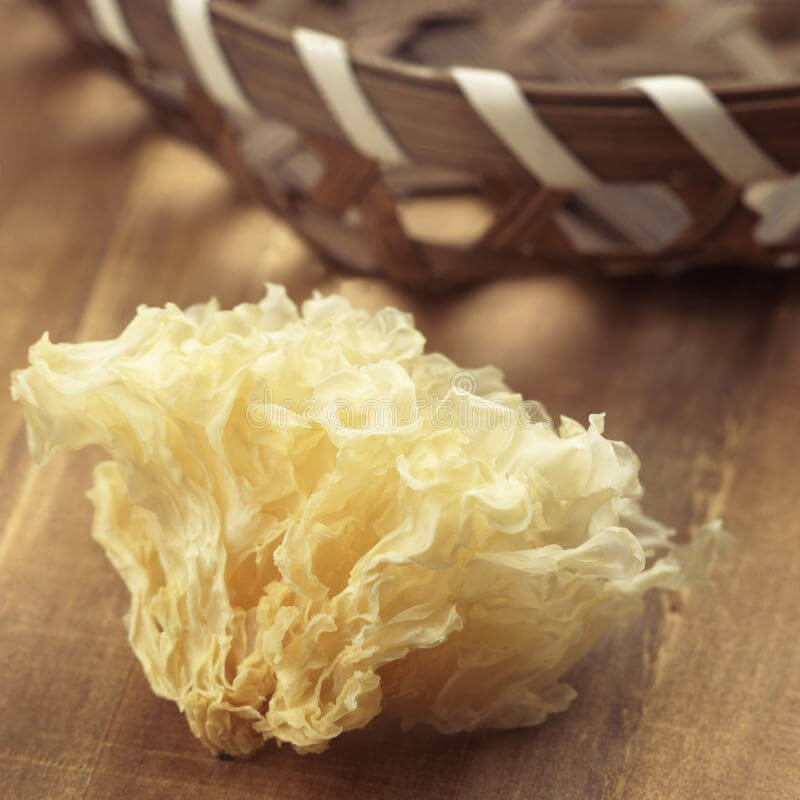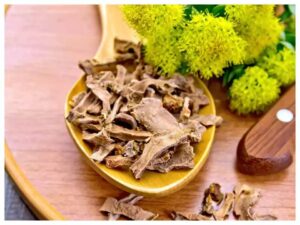The Discovery of Tremella fuciformis: A Brief History
Introduction
Tremella fuciformis, also known as the silver ear mushroom, is a species of edible mushroom that has been used in traditional Chinese medicine for centuries. In this article, we will explore the history of Tremella fuciformis and how it was first discovered.
Early Records
The use of Tremella fuciformis can be traced back to ancient China, where it was used for its medicinal properties. The mushroom was recorded in the Shennong Bencao Jing, one of the earliest known Chinese pharmacopoeias, which dates back to the Han dynasty (206 BCE – 220 CE). In the text, Tremella fuciformis was described as having the ability to “nourish the lung, replenish the stomach, and moisten the skin.”
Traditional Medicine
Tremella fuciformis has been used in traditional Chinese medicine for a variety of health conditions. The mushroom is believed to have anti-inflammatory and antioxidant properties, and is often used to promote healthy skin, boost the immune system, and support respiratory health. In addition, Tremella fuciformis is believed to be effective in treating coughs, colds, and other respiratory ailments.
Western Discovery
The first Western accounts of Tremella fuciformis date back to the 18th century, when European travelers to China encountered the mushroom. The mushroom’s unique texture and appearance – which resembles silver-colored, translucent ears – quickly drew attention. The mushroom was soon imported to Europe and became a popular ingredient in traditional Chinese medicine.
Modern Cultivation
Today, Tremella fuciformis is cultivated worldwide, including in China, Japan, Korea, and the United States. The mushroom is grown on a variety of substrates, including wood chips, corn, and rice. Tremella fuciformis is often used in a range of culinary dishes, including soups, stews, and desserts.
Conclusion
Tremella fuciformis has a rich history and has been used for centuries in traditional Chinese medicine. The mushroom’s unique texture and appearance have drawn attention throughout the world, and it is now cultivated and used in a range of applications, including culinary and medicinal. As always, it is important to consult with a healthcare provider before using any supplements or alternative treatments.
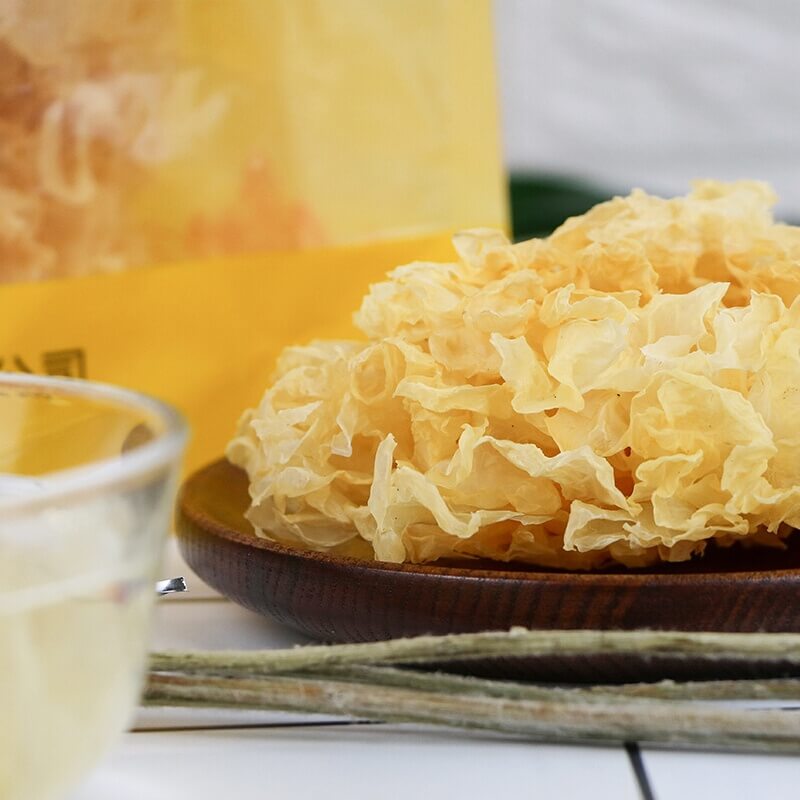
Benefits of Tremella fuciformis for Health
Immune System Boosting
Tremella fuciformis has been shown to have immune-boosting properties, making it an excellent natural remedy for fighting off infections and illnesses. The mushroom contains beta-glucans, a type of polysaccharide that has been shown to stimulate the immune system. Beta-glucans have been shown to activate immune cells, including macrophages and natural killer cells, which play a key role in fighting infections.
Anti-Inflammatory Properties
Tremella fuciformis has anti-inflammatory properties, making it a natural remedy for a variety of inflammatory conditions. Inflammation is the body’s response to injury or infection, but chronic inflammation can lead to a range of health issues, including arthritis, heart disease, and cancer. Tremella fuciformis contains polysaccharides and antioxidants that have been shown to reduce inflammation and protect against oxidative stress.
Skin Health
Tremella fuciformis is a popular ingredient in many skincare products, thanks to its ability to moisturize and nourish the skin. The mushroom contains polysaccharides that help to lock in moisture and improve skin elasticity. In addition, Tremella fuciformis contains antioxidants that help to protect against UV damage and other environmental stressors.
Respiratory Health
Tremella fuciformis has long been used in traditional Chinese medicine as a natural remedy for respiratory ailments, such as coughs and colds. The mushroom contains compounds that have been shown to improve lung function and alleviate symptoms of respiratory conditions. In addition, Tremella fuciformis may help to reduce inflammation in the respiratory system, making it a natural remedy for conditions such as asthma and bronchitis.
Antioxidant Properties
Tremella fuciformis is a rich source of antioxidants, which are compounds that help to protect the body against damage from free radicals. Free radicals are unstable molecules that can cause cellular damage and contribute to the development of chronic diseases, such as cancer and heart disease. Tremella fuciformis contains a range of antioxidants, including polysaccharides and melanin, which have been shown to protect against oxidative stress and reduce the risk of chronic disease.
Diabetes Management
Tremella fuciformis may help to manage diabetes by regulating blood sugar levels. The mushroom contains compounds that have been shown to improve insulin sensitivity and reduce blood sugar levels. In addition, Tremella fuciformis may help to improve lipid metabolism and reduce the risk of complications associated with diabetes.
Digestive Health
Tremella fuciformis has been shown to have prebiotic properties, meaning it can help to support the growth of beneficial bacteria in the gut. The mushroom contains polysaccharides that can help to nourish the gut microbiome, leading to improved digestive health and overall well-being.
Cognitive Function
Tremella fuciformis may help to improve cognitive function and protect against age-related cognitive decline. The mushroom contains compounds that have been shown to improve memory and learning, as well as protect against oxidative stress in the brain. In addition, Tremella fuciformis may help to reduce inflammation in the brain, which is a key factor in the development of neurodegenerative diseases such as Alzheimer’s and Parkinson’s.
Cardiovascular Health
Tremella fuciformis has been shown to have cardiovascular benefits such as reducing blood pressure and cholesterol levels. The mushroom contains compounds that help to relax blood vessels and improve blood flow, which can lower blood pressure and reduce the risk of heart disease. In addition, Tremella fuciformis may help to reduce LDL cholesterol levels, which is the “bad” cholesterol that can contribute to heart disease.
[data:image/svg+xml,%3csvg%20xmlns=%27http://www.w3.org/2000/svg%27%20version=%271.1%27%20width=%2730%27%20height=%2730%27/%3e](data:image/svg+xml,%3csvg%20xmlns=%27http://www.w3.org/2000/svg%27%20version=%271.1%27%20width=%2730%27%20height=%2730%27/%3e)
Weight Management
Tremella fuciformis may help with weight management by promoting feelings of fullness and reducing food cravings. The mushroom contains polysaccharides that can help to slow down the digestion of carbohydrates, leading to a more gradual release of glucose into the bloodstream. This can help to regulate blood sugar levels and reduce food cravings, leading to improved weight management.
Potential Anti-Cancer Properties
Tremella fuciformis contains compounds that have been shown to have anti-cancer properties. The mushroom contains polysaccharides that may help to suppress tumor growth and improve immune function, leading to improved cancer outcomes. While more research is needed to fully understand the anti-cancer properties of Tremella fuciformis, early studies have shown promising results.
Conclusion
Tremella fuciformis is a powerful superfood with numerous health benefits. The mushroom’s immune-boosting, anti-inflammatory, skin-healthy, respiratory-healthy, and antioxidant properties make it an excellent natural remedy for a variety of health conditions. In addition, Tremella fuciformis may help to improve cognitive function, manage diabetes, promote cardiovascular health, and support weight management. As always, it is important to consult with a healthcare provider before using any supplements or alternative treatments.
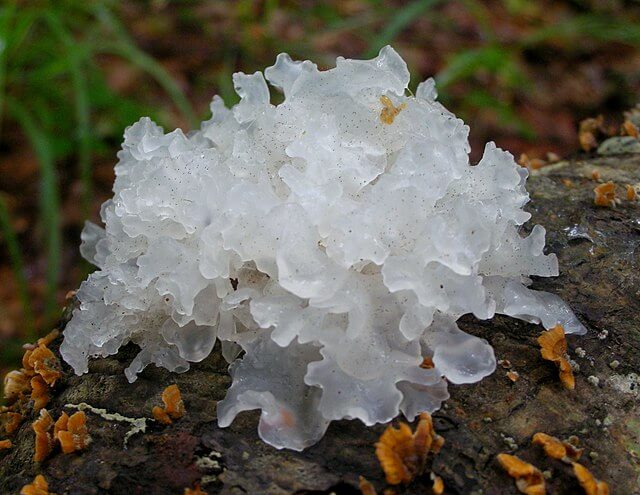
The Nutritional Components and Core Ingredients of Tremella fuciformis
Macronutrients
Tremella fuciformis is a low-calorie food, with just 22 calories per 100 grams. The mushroom is also low in fat, with just 0.2 grams per 100 grams. Tremella fuciformis is a good source of carbohydrates, with 4.9 grams per 100 grams. In addition, the mushroom contains 1.1 grams of protein per 100 grams.
Vitamins and Minerals
Tremella fuciformis is a rich source of vitamins and minerals, making it a nutrient-dense food. The mushroom is particularly high in the B vitamins, including niacin, riboflavin, and thiamin. Tremella fuciformis is also a good source of vitamin D, which is important for bone health and immune function.
In addition to vitamins, Tremella fuciformis is a good source of minerals, including potassium, calcium, and iron. Potassium is important for regulating blood pressure and maintaining a healthy heart. Calcium is important for strong bones and teeth, while iron is important for healthy blood and energy production.
Polysaccharides
Tremella fuciformis is particularly rich in polysaccharides, a type of complex carbohydrate that has numerous health benefits. Polysaccharides are known for their immune-boosting properties, and have been shown to stimulate the production of immune cells, such as macrophages and natural killer cells.
In addition to their immune-boosting properties, polysaccharides have been shown to have anti-inflammatory properties, making them a natural remedy for a range of inflammatory conditions, including arthritis and heart disease. Polysaccharides may also help to improve cognitive function and reduce the risk of neurodegenerative diseases.
Antioxidants
Tremella fuciformis is a rich source of antioxidants, which are compounds that help to protect the body against damage from free radicals. Free radicals are unstable molecules that can cause cellular damage and contribute to the development of chronic diseases, such as cancer and heart disease.
Tremella fuciformis contains a range of antioxidants, including polysaccharides and melanin. Polysaccharides have been shown to protect against oxidative stress and reduce the risk of chronic disease, while melanin may help to protect against UV damage and other environmental stressors.
Prebiotics
Tremella fuciformis has been shown to have prebiotic properties, meaning it can help to support the growth of beneficial bacteria in the gut. The mushroom contains polysaccharides that can help to nourish the gut microbiome, leading to improved digestive health and overall well-being.
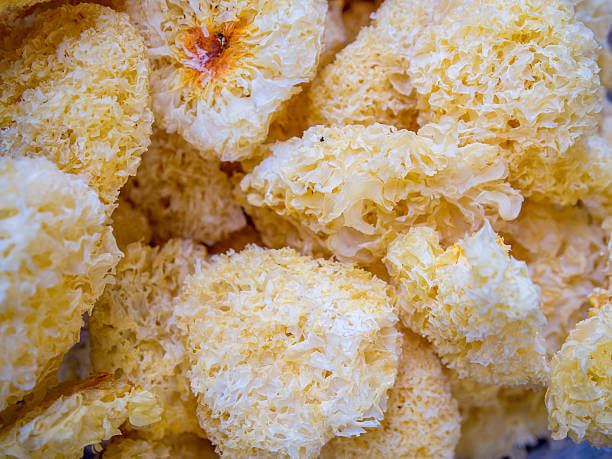
Methods for Consuming Tremella fuciformis
Dried Tremella fuciformis
Dried Tremella fuciformis is one of the most common forms of the mushroom. The dried mushroom can be rehydrated by soaking it in water for several hours. Once the mushroom is fully rehydrated, it can be used in a variety of culinary dishes, including soups, stews, and stir-fries. Dried Tremella fuciformis has a slightly sweet and nutty flavor, and a gelatinous texture when rehydrated.
Tremella fuciformis Powder
Tremella fuciformis powder is made by grinding the dried mushroom into a fine powder. The powder can be added to smoothies, soups, and other culinary dishes for an added nutritional boost. Tremella fuciformis powder is a convenient way to incorporate the mushroom’s health benefits into your diet.
Tremella fuciformis Extract
Tremella fuciformis extract is made by boiling the dried mushroom in water to extract the polysaccharides and other beneficial compounds. The resulting liquid is then concentrated into an extract, which can be consumed as a supplement. Tremella fuciformis extract is a powerful immune booster and may help to reduce inflammation and improve cognitive function.
Tremella fuciformis Tea
Tremella fuciformis tea is a traditional Chinese remedy that has been used for centuries for its health benefits. To make Tremella fuciformis tea, the dried mushroom is simmered in water for several hours to create a flavorful broth. The tea can be enjoyed hot or cold, and can be sweetened with honey or other natural sweeteners.
Tremella fuciformis Capsules
Tremella fuciformis capsules are a convenient way to consume the mushroom’s health benefits. The capsules contain a concentrated dose of Tremella fuciformis extract, which can be easily added to your daily supplement routine. Tremella fuciformis capsules are a great option for those who want to take advantage of the mushroom’s immune-boosting and anti-inflammatory properties.
Tremella fuciformis in Culinary Dishes
Tremella fuciformis can be used in a variety of culinary dishes to add a nutritional boost. The mushroom has a gelatinous texture when rehydrated, making it a great addition to soups, stews, and stir-fries. Tremella fuciformis can also be used as a thickener in sauces and gravies. In addition, Tremella fuciformis powder can be added to smoothies, oatmeal, and other breakfast dishes for an added nutritional boost.

Potential Side Effects and When to Avoid Taking Tremella fuciformis
Allergic Reactions
Like all foods, Tremella fuciformis has the potential to cause allergic reactions in some individuals. Allergic reactions to Tremella fuciformis are rare, but can include symptoms such as hives, itching, and difficulty breathing. If you experience any symptoms of an allergic reaction after consuming Tremella fuciformis, seek medical attention immediately.
Interactions with Medications
Tremella fuciformis may interact with certain medications, including anticoagulants and immunosuppressants. The mushroom has blood-thinning properties, which may increase the risk of bleeding in individuals taking anticoagulants. In addition, Tremella fuciformis may stimulate the immune system, which may be harmful for individuals taking immunosuppressants.
If you are taking any medications, it is important to consult with a healthcare provider before adding Tremella fuciformis to your diet.
Digestive Issues
Tremella fuciformis is generally well-tolerated by the digestive system, but some individuals may experience digestive issues after consuming the mushroom. The mushroom’s high fiber content may cause gastrointestinal discomfort, including bloating, gas, and diarrhea.
If you experience any digestive issues after consuming Tremella fuciformis, reduce your intake or stop consuming the mushroom altogether.
Heavy Metal Contamination
Tremella fuciformis is a hyperaccumulator, which means that it can absorb heavy metals from the soil in which it is grown. Heavy metal contamination in Tremella fuciformis can be a concern, particularly for mushrooms grown in polluted areas. The consumption of contaminated Tremella fuciformis can lead to heavy metal poisoning, which can cause a range of health issues, including neurological problems and organ damage.
To avoid heavy metal contamination, it is important to source Tremella fuciformis from reputable suppliers and to choose mushrooms that have been grown in clean, uncontaminated environments.
Avoid During Pregnancy and Breastfeeding
There is limited research on the safety of Tremella fuciformis during pregnancy and breastfeeding. As a precaution, it is recommended that pregnant and breastfeeding women avoid consuming Tremella fuciformis until more research is available.
Conclusion
While the mushroom is generally considered safe for consumption, there are some potential side effects and situations in which it should be avoided. Allergic reactions, interactions with medications, digestive issues, heavy metal contamination, and pregnancy and breastfeeding are all factors to consider before consuming Tremella fuciformis. As always, it is important to consult with a healthcare provider before using any supplements or alternative treatments.
The Drug Interactions of Tremella fuciformis
Anticoagulants
Tremella fuciformis may interact with anticoagulants, also known as blood thinners. The mushroom has blood-thinning properties, which may increase the risk of bleeding in individuals taking anticoagulants. Some common anticoagulants include warfarin, heparin, and clopidogrel.
If you are taking anticoagulants, it is important to speak with your healthcare provider before adding Tremella fuciformis to your diet.
Immunosuppressants
Tremella fuciformis may also interact with immunosuppressants. The mushroom has immune-stimulating properties, which may be harmful for individuals taking immunosuppressants. Some common immunosuppressants include azathioprine, cyclosporine, and tacrolimus.
If you are taking immunosuppressants, it is important to speak with your healthcare provider before adding Tremella fuciformis to your diet.
Diabetes Medications
Tremella fuciformis may interact with diabetes medications, including insulin and oral hypoglycemic agents. The mushroom may lower blood sugar levels, which may cause hypoglycemia in individuals taking diabetes medications.
If you are taking diabetes medications, it is important to monitor your blood sugar levels closely if you add Tremella fuciformis to your diet.
Blood Pressure Medications
Tremella fuciformis may also interact with blood pressure medications, including ACE inhibitors and beta-blockers. The mushroom may lower blood pressure levels, which may cause hypotension in individuals taking blood pressure medications.
If you are taking blood pressure medications, it is important to monitor your blood pressure levels closely if you add Tremella fuciformis to your diet.
